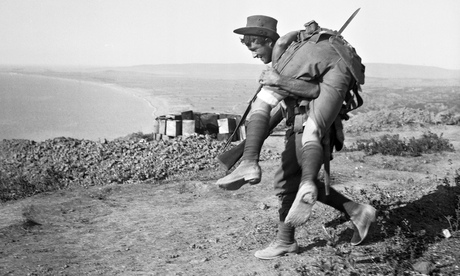
The Gallipoli campaign was Winston Churchill’s idea. In January 1915 he persuaded the British cabinet that the best way to break out of the stalemate that had settled on the Western Front was to launch an attack on Germany’s ally, Turkey, via the Dardanelles peninsula. In the event, Gallipoli became a catalogue of disasters. The naval bombardment had to be abandoned after heavy losses and when military landings followed a month later they never managed to penetrate far inland. The British commander, Sir Ian Hamilton, was weak and gentlemanly, and his generals included a fair share of butchers and bunglers, whereas their German and Turkish opponents were competent soldiers and effective leaders. The much-despised Turk proved a formidable enemy, as did the flies and the dysentery. Further attacks achieved nothing. When the beachheads were finally abandoned, after a year, some 21,000 British, 8,000 Australian and 2,700 New Zealand soldiers had died – for no discernible military gain.
For the British, Gallipoli remains a byword for wayward strategy, military futility, and official bungling. But for Australia, it has always meant much more than that – at Gallipoli the country came of age and found its identity. Australians discovered that they were bigger and braver than the British, but they also learned not to put their trust in the mother country and in British generals. And, according to national legend, it was the Australian journalist Keith Murdoch (father of Rupert) who broke the conspiracy of silence about what was happening at Gallipoli.
From the first the Australians felt a sacred duty to record Gallipoli. Their official historian, Charles Bean, meticulously took down soldiers’ frontline experiences and vigilantly guarded the flame of the “Anzac legend” – the idea that a distinctive “Australian manhood”, composed of bravery, modesty and mateship, had been displayed at Gallipoli. Since Bean’s day, nearly every Australian journalist of distinction, from Alan Moorehead on, has returned to his theme – and raided his vast storehouse of material. In 2001, Les Carlyon of the Melbourne Age produced a meticulously researched and pungently written account: totally Australian, yet fair to the Poms. Now it is the turn of Peter FitzSimons, a columnist on the Sydney Morning Herald.
Although it has some new material on the Turkish side, by and large this Gallipoli is the familiar Australian version and, as such, inferior to Carlyon’s excellent book. FitzSimons deploys many of the techniques of fiction, reworking reported speech as dialogue and employing the present tense throughout. The effect is like reading the screenplay for a Downton Abbey-style television seriesThings improve once FitzSimons gets to Gallipoli itself. He gives solid and gripping accounts of the great set pieces – the Battle of Lone Pine, where seven Victoria Crosses were won, and the Nek, the engagement depicted in Peter Weir’s film Gallipoli, in which the Light Horsemen were ordered to carry out a third hopeless charge, even though the men in the first two lines had already been shot to pieces.
British readers may be more interested in the Murdoch question. In his book, Les Carlyon was emphatic that the real credit for exposing the scandals at the Dardanelles lay with the colourful British journalist-adventurer Ellis Ashmead-Bartlett rather than with Keith Murdoch. FitzSimons doesn’t go that far. While agreeing that others played an important part, he thinks that the letter Murdoch composed in London in September 1915 administered the knockout blow to the Gallipoli expedition. It was certainly the start of a remarkable career.
Gallipoli is published by Bantam Press (£30). Click here to buy it for £24

